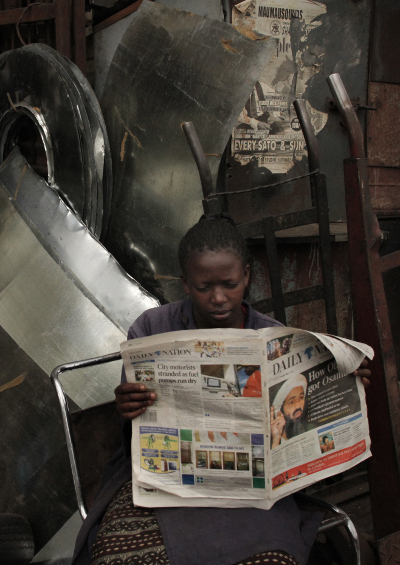Enterprise in Kenya: Small Business is a Big Dream
Moses has forged a truly successful small businesses in Kenya but his story is a rare one.
November 2, 2014

Crimea-born Sergey Maximishin grew up in the USSR and worked as a photographer with the Soviet Army. He has worked as a photographer for over two decades and has won many awards since starting his career. Maximishin currently works for “Focus,” a German magazine.
Across one square kilometer of Nairobi’s Gikomba district, more than 4,000 people work for 200 businesses that process scrap metal.
Known as jua kali enterprises – the official term for people who work beneath the open sky (jua kali is Swahili for “scorching sun”) – these businesses turn empty oil barrels, construction waste, steel pipes, paint cans and other metal items into everything from pans and tools to life-size statues of animals.
Most of the workers are from western Kenya. They work 12-hour days, with no holidays, sick pay or other benefits. The average salary is $100 a month. Only around one-fifth of their output is sold in Kenya. The rest is exported to other East African countries and – in the case of the animal statues – to Europe.
Recently, the jua kali industry has faced a shortage of raw materials. Unable to buy empty barrels in Kenya, businesses now buy them in Tanzania.
Text and photographs by Sergey Maximishin
 Enlarge Oil drums are the main raw material source for Kenya’s jua kali industry.
Enlarge Oil drums are the main raw material source for Kenya’s jua kali industry. Enlarge Most jua kali businesses employ between four and six men, each of whom dreams of earning enough money to start their own business.
Enlarge Most jua kali businesses employ between four and six men, each of whom dreams of earning enough money to start their own business. Enlarge Moses set up his jua kali workshop ten years ago. At first he made furniture, but six years ago he switched to making animal sculptures for export at the suggestion of a European customer. His business is now one of the most successful in the Gikomba area, and many others have started making identical copies of his designs.
Enlarge Moses set up his jua kali workshop ten years ago. At first he made furniture, but six years ago he switched to making animal sculptures for export at the suggestion of a European customer. His business is now one of the most successful in the Gikomba area, and many others have started making identical copies of his designs. Crimea born Sergey Maximishin grew up in the USSR, and worked with the Soviet Army as a photographer. He has an education in both photography and physics. Maximishin currently works for “Focus,” a German agency, and previously worked for a newspaper called Izvestia. He has worked as a photographer for over two decades, and won many awards since starting his career.
Crimea born Sergey Maximishin grew up in the USSR, and worked with the Soviet Army as a photographer. He has an education in both photography and physics. Maximishin currently works for “Focus,” a German agency, and previously worked for a newspaper called Izvestia. He has worked as a photographer for over two decades, and won many awards since starting his career.The Other Hundred is a unique photo-book project (order here) aimed as a counterpoint to the Forbes 100 and other media rich lists by telling the stories of people around the world who are not rich but who deserve to be celebrated.
Its 100 photo-stories move beyond the stereotypes and cliches that fill so much of the world’s media to explore the lives of people whose aspirations and achievements are at least as noteworthy as any member of the world’s richest 1,000.
 Selected from 11,000 images shot in 158 countries and submitted by nearly 1,500 photographers, The Other Hundred celebrates those who will never find themselves on the world’s rich lists or celebrity websites.
Selected from 11,000 images shot in 158 countries and submitted by nearly 1,500 photographers, The Other Hundred celebrates those who will never find themselves on the world’s rich lists or celebrity websites.


